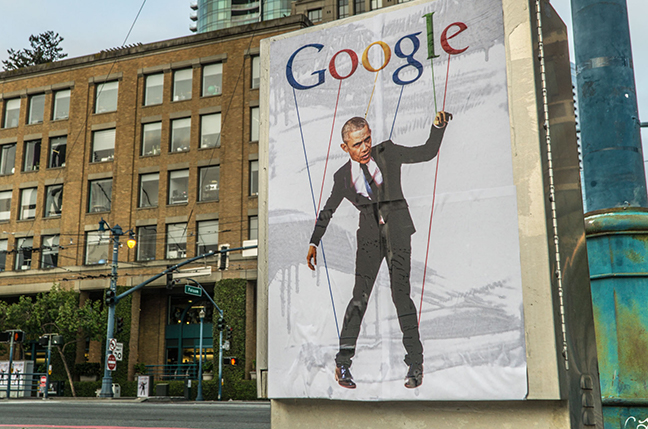This article is more than 1 year old
FCC death vote looms for the Golden Age of American TV
The inside story of Google's plan to pwn the TV biz
Enter the special interest mob
The FCC had decreed that “public interest groups” should attend the DSTAC meetings were and one of these was Public Knowledge, the ersatz Google-funded NGO. Public Knowledge can be thought of as a more policy-focused splinter from the Electronic Frontier Foundation, but similarly reflecting Silicon Valley’s interests. It helps if you can cloak your business interests behind a “citizens' group”.
The Ditch The Box proposal made cable boxes obsolete – but it wasn't Google-y enough for FCC chairman Tom Wheeler
The alternative plan envisaged a "virtual headend", with a much longer transition. The details would be worked out at some point in the future. Although the FCC isn’t formally permitted to devise radical policy shifts, here it did, with Public Knowledge as the FCC’s proxy. Public Knowledge backed the virtual headend plan (the Google-y alternative) and the FCC jumped in to support it.
Earlier this year FCC chairman Tom Wheeler addressed a Public Knowledge meeting apologising for “stealing” its chief executive Gigi Sohn to become his "special counsel for external affairs" at the FCC.
Public Knowledge and Google had other ideas. Before the DSTAC proposal was widely circulated, Google was giving demonstrations in its Washington DC office to wonks and policy makers of how it thought TV should work.
And what do you think Google’s vision of TV looks like, dear reader?
Crucially, there are two main differences. In Google’s ideal world the curation and content management of the “appified” DSTAC are absent, giving Google users the ability to take what content they want and present it all on YouTube, without having to enter the kind of negotiations for content that everyone else needs to do. Google users can stick the latest hit HBO show into another YouTube channel, and there’s nothing the show’s creators or HBO can do about it. This has not just alarmed the big MVPDs such as Comcast: small indie producers (the MPAA’s traditional foes) see it as a moral threat.

FCC chairman Tom Wheeler moved to Chicago to become one of Obama's main fundraisers. Google has unprecedented access to the White House.
San Francisco street art
A political economy of breaking things
Today, watching TV is one of the few areas in life left where we spend many hours away from Google’s obsessive data collection business and its pervasive advertising machine. But this would change all that: Google would have access to all the data our TV viewing generates. It could sell its own ads against other people’s content, without paying for it, while evading the rules for minority programming or protecting children from inappropriate content. Nice work.
Historically, big corporations have always tried to use government regulations as leverage to help further their business interests, but rarely, if ever, on such a tectonic plate-shifting scale. It’s as if Bell had succeeded in regulating the microprocessor in the early 1970s, so that only Bell could make and use them.
Nothing inhibits Google from “doing a Netflix” itself, and becoming a terrific competitor to Netflix and Apple, other than its own cultural baggage. Remember Google does things at scale well, and it could decide to take the ethical route, playing by the rules that everyone else plays by – i.e., entering into market negotiations for rights. It isn’t hard to imagine that if it did, Google would soon be at the front of the pack, or even leading it.
Doesn’t all that data Google collects translate into worthwhile cultural insights? So wouldn’t an ethical Google be making the best shows? Hold that thought.
Today, the important people in and around Silicon Valley have drunk the “disruption” Kool Aid. This is really a new kind of “Manifest Destiny”: the belief is that you can only succeed by breaking things or shafting someone. Breaking things becomes an obligation.
Google’s proposal takes an end run around both private contracts (previously held to be sacred) and property rights (similarly so). Google represents a new kind of company – and, perhaps even a new kind of capitalism. The zero-sum logic is that for Google to win, someone has to lose. In this case, the loser is a $200bn industry that looks quite healthy.
The swing vote today is held by FCC Commissioner Jessica Rosenworcel. She's already known to believe the Google-favoured plan to be flawed. If only we could see it, we could form our own judgement.
It’s just a hunch, but I suspect Google may have overreached this time. Ordinary Americans just want their TV, without the lock-in or fees, and DSTAC’s appified open standards approach fulfils that. Google’s secretive and ambiguous alternative doesn’t, and risks breaking things. People expecting this story to fulfil Public Knowledge’s child-like, simplistic narrative of Good (internet) vs Evil (cablecos, rights holders) will find a few wrinkles in The Matrix, once they look closely.
Later today we’ll find out how the FCC votes. And maybe even what's it actually voted for. ®
Stop press: The FCC has postponed the vote. "It was simply a matter of running out of time,” the watchdog's chairman Tom Wheeler told reporters on Thursday.
